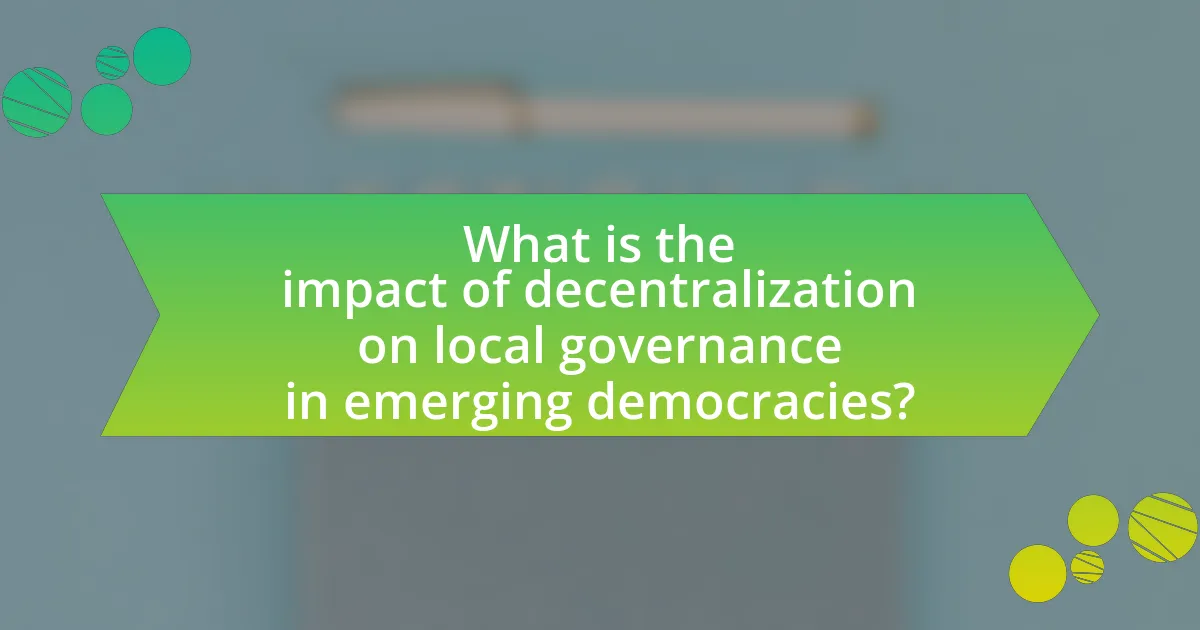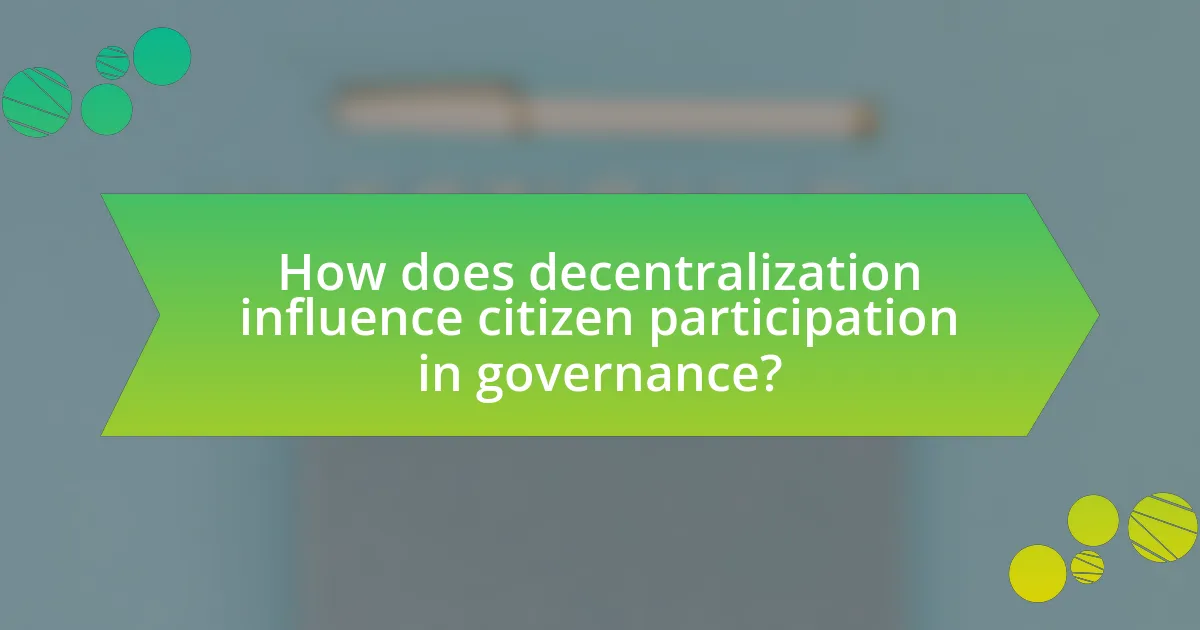The article examines the impact of decentralization on local governance in emerging democracies, highlighting how this process enhances citizen participation, accountability, and service delivery. It discusses the redefinition of local governance structures, key principles of decentralization, and the historical contexts that have shaped current practices. The article also addresses the challenges posed by decentralization, such as unequal resource distribution and local elite capture, while emphasizing the role of international organizations in promoting effective governance. Additionally, it explores mechanisms for citizen engagement, the influence of community organizations, and best practices for improving local governance outcomes.

What is the impact of decentralization on local governance in emerging democracies?
Decentralization significantly enhances local governance in emerging democracies by promoting greater citizen participation and improving service delivery. This shift allows local governments to tailor policies and services to the specific needs of their communities, leading to increased accountability and responsiveness. For instance, a study by the World Bank in 2019 indicated that countries like Indonesia and Brazil experienced improved public service outcomes and citizen satisfaction following decentralization reforms. These reforms empower local authorities, enabling them to make decisions that directly affect their constituents, thereby fostering a more engaged and informed citizenry.
How does decentralization redefine local governance structures?
Decentralization redefines local governance structures by redistributing authority and resources from central governments to local entities, enhancing local autonomy and responsiveness. This shift allows local governments to tailor policies and services to the specific needs of their communities, fostering greater citizen participation and accountability. For instance, according to the World Bank, countries that have implemented decentralization reforms often experience improved public service delivery and increased citizen engagement in governance processes. This transformation leads to more effective local governance, as local leaders are better positioned to address the unique challenges faced by their constituents.
What are the key principles of decentralization in governance?
The key principles of decentralization in governance include autonomy, accountability, participation, and efficiency. Autonomy allows local governments to make decisions independently, fostering a sense of ownership and responsiveness to local needs. Accountability ensures that local authorities are answerable to their constituents, enhancing transparency and trust in governance. Participation encourages citizen involvement in decision-making processes, which can lead to more representative and effective governance. Efficiency is achieved by bringing decision-making closer to the people, allowing for quicker responses to local issues and better resource allocation. These principles are supported by various studies, such as the World Bank’s report on decentralization, which highlights the positive impacts of these principles on local governance and service delivery in emerging democracies.
How does decentralization affect decision-making at the local level?
Decentralization enhances decision-making at the local level by transferring authority and resources from central governments to local entities. This shift allows local governments to respond more effectively to the specific needs and preferences of their communities, leading to more tailored and relevant policy outcomes. For instance, a study by the World Bank in 2019 found that countries with decentralized governance structures reported higher citizen satisfaction with public services, as local leaders are better positioned to address local issues directly. Additionally, decentralization fosters greater accountability, as local officials are more accessible to their constituents, which can lead to improved governance and increased public trust.
What are the historical contexts of decentralization in emerging democracies?
Decentralization in emerging democracies historically stems from the need to address governance challenges, promote local autonomy, and enhance citizen participation. In the late 20th century, many countries transitioned from authoritarian regimes to democratic governance, leading to reforms that aimed to distribute power away from central authorities. For instance, in Latin America during the 1980s and 1990s, countries like Brazil and Argentina implemented decentralization policies to empower local governments and improve service delivery, reflecting a global trend towards democratization and local governance. These reforms were often influenced by international organizations advocating for participatory governance, which emphasized the importance of local decision-making in fostering accountability and responsiveness.
How have past governance models influenced current decentralization efforts?
Past governance models have significantly shaped current decentralization efforts by providing frameworks that inform the distribution of power and resources. Historical examples, such as the federal systems in countries like the United States and Germany, demonstrate how power-sharing arrangements can enhance local governance and citizen participation. These models have influenced contemporary approaches by emphasizing the importance of local autonomy, accountability, and responsiveness to community needs. For instance, the devolution of authority in the UK since the late 1990s has drawn on lessons from earlier governance structures, leading to more localized decision-making processes that aim to improve service delivery and democratic engagement.
What role do international organizations play in promoting decentralization?
International organizations play a crucial role in promoting decentralization by providing technical assistance, funding, and policy frameworks that support local governance initiatives. For instance, organizations like the United Nations Development Programme (UNDP) and the World Bank offer resources and expertise to help countries design and implement decentralized governance structures. These organizations often conduct assessments and share best practices, which facilitate knowledge transfer and capacity building at the local level. Additionally, international organizations advocate for decentralization as a means to enhance democratic governance, improve public service delivery, and empower local communities, thereby contributing to more responsive and accountable governance systems in emerging democracies.
What challenges does decentralization pose to local governance?
Decentralization poses several challenges to local governance, including potential disparities in resource allocation, increased complexity in administrative processes, and the risk of local elite capture. Resource allocation can become uneven, as wealthier regions may have more capacity to generate revenue, leading to inequalities in service delivery. The complexity of administrative processes can overwhelm local governments, which may lack the necessary expertise and infrastructure to manage new responsibilities effectively. Additionally, local elite capture can occur when powerful local actors manipulate decentralized systems for their own benefit, undermining democratic accountability and equity in governance. These challenges highlight the need for careful planning and support mechanisms to ensure that decentralization enhances rather than hinders local governance.
How does decentralization impact accountability and transparency?
Decentralization enhances accountability and transparency by distributing power and decision-making closer to the local level. This shift allows citizens to engage more directly with their local governments, fostering greater scrutiny of public officials and their actions. For instance, studies have shown that in decentralized systems, local governments are more responsive to community needs, as evidenced by increased citizen participation in local governance processes, which can lead to improved service delivery and reduced corruption. Research conducted by the World Bank indicates that countries with decentralized governance structures often report higher levels of public trust and satisfaction, demonstrating a clear link between decentralization, enhanced accountability, and transparency in governance.
What are the risks of unequal resource distribution in decentralized systems?
Unequal resource distribution in decentralized systems poses significant risks, including increased social inequality, reduced public trust, and potential for conflict. When resources are not evenly allocated, certain regions or groups may experience economic advantages, leading to disparities in development and access to services. This can foster resentment among marginalized communities, eroding trust in local governance and institutions. Furthermore, historical examples, such as the disparities seen in post-apartheid South Africa, illustrate how unequal resource distribution can lead to social unrest and conflict, undermining the stability of decentralized governance structures.

How does decentralization influence citizen participation in governance?
Decentralization enhances citizen participation in governance by transferring decision-making authority from central to local governments, thereby increasing accessibility and responsiveness to community needs. This shift allows citizens to engage more directly in the political process, as local governments are often more attuned to the specific issues and preferences of their constituents. For instance, a study by the World Bank in 2018 found that countries with decentralized governance structures reported higher levels of citizen engagement in local decision-making processes, leading to improved public service delivery and greater accountability.
What mechanisms facilitate citizen engagement in decentralized governance?
Mechanisms that facilitate citizen engagement in decentralized governance include participatory budgeting, local councils, and digital platforms. Participatory budgeting allows citizens to directly influence budget allocations, enhancing transparency and accountability. Local councils empower community members to voice their concerns and contribute to decision-making processes, fostering a sense of ownership and responsibility. Digital platforms, such as online forums and social media, enable broader participation by providing accessible channels for communication and feedback. These mechanisms have been shown to improve civic engagement and strengthen democratic practices, as evidenced by case studies in various emerging democracies where citizen involvement has led to more responsive governance.
How do local elections change under decentralized governance?
Local elections become more competitive and representative under decentralized governance. This shift occurs because power is transferred from central authorities to local governments, allowing communities to have a greater say in their leadership and policies. For instance, in countries like Brazil and India, decentralization has led to increased voter participation and the emergence of local political parties that better reflect community interests. Research indicates that decentralized governance can enhance accountability, as local officials are more directly answerable to their constituents, thereby fostering a more engaged electorate.
What role do community organizations play in enhancing citizen participation?
Community organizations play a crucial role in enhancing citizen participation by facilitating communication between citizens and local governments. These organizations empower individuals by providing platforms for dialogue, education, and advocacy, which increases civic engagement. For instance, studies show that community organizations can lead to higher voter turnout and increased involvement in local decision-making processes, as they mobilize residents and provide them with the necessary resources and information to participate effectively. Additionally, research indicates that areas with active community organizations experience more robust democratic practices, as these entities help bridge the gap between citizens and policymakers, ensuring that diverse voices are heard in governance.
How does decentralization affect public service delivery?
Decentralization enhances public service delivery by transferring authority and resources from central to local governments, allowing for more tailored and responsive services. This shift enables local authorities to address community-specific needs more effectively, as they possess better knowledge of local conditions and priorities. For instance, a study by the World Bank in 2017 indicated that countries with decentralized governance structures often experience improved access to education and healthcare services, as local governments can allocate resources based on immediate community demands. Additionally, decentralization fosters greater accountability, as local officials are directly answerable to their constituents, leading to increased citizen engagement and satisfaction with public services.
What improvements can be observed in service delivery post-decentralization?
Post-decentralization, improvements in service delivery include enhanced responsiveness to local needs, increased efficiency, and greater community participation. Local governments, empowered by decentralization, can tailor services to the specific demands of their communities, leading to quicker decision-making and implementation. For instance, a study by the World Bank in 2019 indicated that countries with decentralized governance structures reported a 20% increase in citizen satisfaction with public services. Additionally, decentralization often results in better resource allocation, as local authorities have a clearer understanding of their constituents’ priorities, which can lead to more effective use of funds and improved service outcomes.
How do local governments prioritize services in a decentralized framework?
Local governments prioritize services in a decentralized framework by assessing community needs, available resources, and policy objectives. They often conduct surveys and engage with citizens to identify pressing issues, which helps in aligning services with local priorities. For instance, a study by the World Bank in 2020 highlighted that local governments in emerging democracies utilize participatory budgeting processes to ensure that community input directly influences service allocation. This approach not only enhances accountability but also fosters a sense of ownership among residents, leading to more effective governance.
What are the implications of decentralization for social equity?
Decentralization can enhance social equity by redistributing power and resources to local governments, allowing for more tailored responses to community needs. This shift enables marginalized groups to have greater representation and influence in decision-making processes, which can lead to more equitable access to services and opportunities. For instance, studies have shown that in countries like Brazil, decentralization has led to improved public health outcomes in underserved areas due to localized governance that prioritizes the specific needs of those communities. Additionally, when local authorities are empowered, they can implement policies that directly address social inequalities, fostering a more inclusive environment.
How does decentralization address the needs of marginalized communities?
Decentralization addresses the needs of marginalized communities by empowering local governance structures to make decisions that directly reflect the unique needs and priorities of these groups. This localized decision-making process enhances community participation, allowing marginalized populations to have a voice in governance, which is often overlooked in centralized systems. For instance, studies show that in countries like Bolivia, decentralization has led to increased investment in local health and education services, directly benefiting indigenous and rural populations who previously faced systemic neglect. By redistributing power and resources, decentralization fosters greater accountability and responsiveness from local authorities, ensuring that the specific challenges faced by marginalized communities are prioritized and addressed effectively.
What strategies can be employed to ensure equitable resource allocation?
To ensure equitable resource allocation, strategies such as participatory budgeting, needs assessments, and transparent decision-making processes can be employed. Participatory budgeting involves engaging community members in the allocation process, allowing them to express their priorities and needs, which has been shown to lead to more equitable outcomes in cities like Porto Alegre, Brazil. Needs assessments utilize data to identify disparities in resource distribution, ensuring that resources are directed to areas with the greatest need, as evidenced by programs in various countries that have successfully reduced inequalities. Transparent decision-making processes foster accountability and trust, enabling stakeholders to understand how resources are allocated and to challenge inequities, which is supported by research indicating that transparency improves governance and resource distribution in decentralized systems.

What best practices can enhance the effectiveness of decentralization in local governance?
Best practices that can enhance the effectiveness of decentralization in local governance include establishing clear legal frameworks, promoting citizen participation, and ensuring adequate resource allocation. Clear legal frameworks define the roles and responsibilities of local governments, which fosters accountability and transparency. For instance, countries like Brazil have implemented laws that empower municipalities, leading to improved service delivery. Promoting citizen participation through mechanisms such as public consultations and participatory budgeting enhances community engagement and ensures that local needs are addressed. Research by the World Bank indicates that participatory governance can lead to better public service outcomes. Finally, ensuring adequate resource allocation is crucial; local governments must have the financial means to implement policies effectively. Evidence from various studies shows that municipalities with stable funding sources are more successful in delivering services and meeting community needs.
How can local governments strengthen their capacity for decentralized governance?
Local governments can strengthen their capacity for decentralized governance by enhancing local administrative skills and increasing community engagement. Training programs focused on governance, financial management, and public service delivery can equip local officials with the necessary competencies. For instance, the United Nations Development Programme (UNDP) has implemented capacity-building initiatives in various countries, demonstrating that targeted training improves local governance effectiveness. Additionally, fostering citizen participation through public forums and feedback mechanisms ensures that local governments remain accountable and responsive to community needs, as evidenced by successful participatory budgeting processes in cities like Porto Alegre, Brazil.
What training programs are essential for local officials in decentralized systems?
Essential training programs for local officials in decentralized systems include governance training, financial management, community engagement, and policy development. Governance training equips officials with knowledge about legal frameworks and administrative processes, which is crucial for effective local governance. Financial management training is vital for understanding budgeting, resource allocation, and fiscal responsibility, as decentralized systems often grant local authorities greater financial autonomy. Community engagement training fosters skills in participatory decision-making and stakeholder communication, ensuring that local officials can effectively involve citizens in governance. Lastly, policy development training helps officials design and implement policies that address local needs and priorities, enhancing the responsiveness of decentralized governance. These programs are supported by various studies indicating that well-trained local officials lead to improved governance outcomes in decentralized contexts.
How can technology be leveraged to improve local governance outcomes?
Technology can be leveraged to improve local governance outcomes by enhancing transparency, increasing citizen engagement, and streamlining service delivery. For instance, digital platforms enable local governments to share information and data with citizens, fostering accountability and trust. According to a study by the World Bank, e-governance initiatives have led to a 20% increase in citizen participation in local decision-making processes in various emerging democracies. Additionally, mobile applications can facilitate real-time feedback from residents, allowing local authorities to address issues promptly and effectively. This integration of technology not only improves operational efficiency but also empowers citizens, ultimately leading to better governance outcomes.
What role does community feedback play in decentralized governance?
Community feedback is essential in decentralized governance as it ensures that decision-making reflects the needs and preferences of the local population. This participatory approach enhances transparency and accountability, allowing citizens to influence policies directly. Research indicates that systems incorporating community feedback can lead to improved public services and greater citizen satisfaction, as seen in various case studies across emerging democracies. For instance, a study by the World Bank highlights that local governments that actively solicit and integrate community input tend to achieve better developmental outcomes and foster trust among citizens.
How can local governments effectively gather and utilize citizen feedback?
Local governments can effectively gather and utilize citizen feedback by implementing structured engagement strategies such as surveys, town hall meetings, and digital platforms. These methods allow for direct communication between citizens and local authorities, ensuring that feedback is collected systematically. For instance, a study by the World Bank in 2020 highlighted that municipalities that employed online surveys saw a 30% increase in citizen participation compared to traditional methods. Additionally, utilizing data analytics to interpret feedback can help local governments prioritize issues based on community needs, leading to more responsive governance. This approach not only enhances transparency but also fosters trust between citizens and local officials, ultimately improving public service delivery.
What are the best practices for fostering collaboration between local governments and communities?
The best practices for fostering collaboration between local governments and communities include establishing clear communication channels, engaging in participatory decision-making, and building trust through transparency. Clear communication ensures that both local governments and community members understand each other’s needs and priorities, which is essential for effective collaboration. Participatory decision-making involves including community members in the planning and implementation processes, which enhances ownership and accountability. Building trust through transparency, such as sharing information about budgets and decision-making processes, fosters a cooperative environment. Research indicates that these practices lead to improved governance outcomes, as seen in various case studies where community engagement has resulted in more responsive and effective local policies.
What lessons can be learned from successful decentralized governance models?
Successful decentralized governance models demonstrate that local autonomy enhances citizen engagement and accountability. For instance, in countries like Switzerland, decentralized decision-making has led to higher voter participation rates, with over 40% of eligible voters participating in local referendums. This increased engagement fosters a sense of ownership among citizens, leading to more responsive governance. Additionally, successful models often emphasize transparency and inclusivity, as seen in the participatory budgeting initiatives in Brazil, which have resulted in more equitable resource distribution and improved public services. These examples illustrate that decentralization can empower communities, enhance democratic practices, and improve governance outcomes.
Which countries exemplify effective decentralization practices?
Countries that exemplify effective decentralization practices include Switzerland, Germany, and Canada. Switzerland operates under a federal system where cantons have significant autonomy, allowing for tailored governance that meets local needs. Germany’s federal structure grants states substantial powers, enabling them to address regional issues effectively. Canada employs a decentralized approach through its provinces, which have authority over various sectors, fostering local decision-making and responsiveness. These examples demonstrate how decentralization can enhance governance by empowering local authorities and improving public service delivery.
What common challenges did these countries overcome in their decentralization efforts?
Countries engaged in decentralization efforts commonly overcame challenges such as resistance from central authorities, lack of local capacity, and inadequate financial resources. Resistance from central authorities often manifested as reluctance to relinquish power, which hindered the effective transfer of responsibilities to local governments. For instance, in countries like Brazil and India, central governments initially resisted decentralization reforms due to fears of losing control over local governance.
Additionally, the lack of local capacity was a significant hurdle, as many local governments lacked the necessary skills and infrastructure to manage new responsibilities effectively. In South Africa, for example, newly formed local governments faced challenges in governance due to insufficient training and resources.
Inadequate financial resources also posed a challenge, as local governments often depended on central funding, which was not always guaranteed. This was evident in countries like Uganda, where local governments struggled to deliver services due to limited budgets. These challenges were critical in shaping the decentralization process and required strategic interventions to ensure successful implementation.






